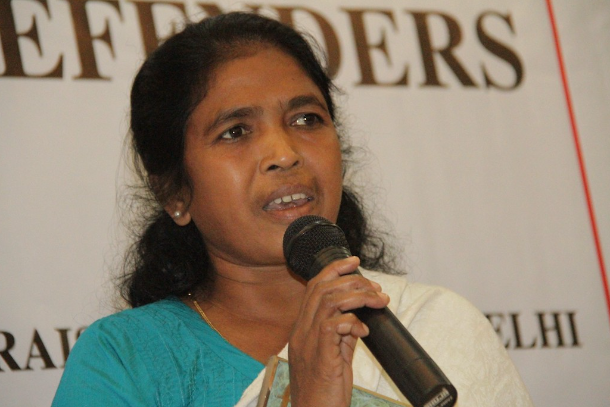Event to honor tribal activist Soni Sori told that minorities are suffering orchestrated violence

Activist Soni Sori addresses a seminar in New Delhi on Sept. 19. Activists say unity and coordination are needed to ensure minority rights in India. (Photo by Bijay Kumar Minj/ucanews.com)
Rights activists in India have called for more united and coordinated work to ensure the rights of religious minorities, tribal and Dalit people.
Activists, lawyers and civil society met in New Delhi to honor Soni Sori, a tribal activist who was chosen by Ireland-based rights organization Front Line Defenders for an award this year.
“Sori has become an inspiration to fight for rights violations in India at a time when the nation is witnessing orchestrated violence against minorities,” Supreme Court lawyer and activist Colin Gonsalves told the Sept. 19 gathering.
“We all can learn from her that if we are firm and united no forces can deny our rights.”
Sori was arrested in 2011 on charges of helping Maoist insurgents. While in custody, she was tortured and sexually assaulted by Chhattisgarh state police. By April 2013, she had been acquitted of six of eight cases against her due to lack of evidence. In 2016, unidentified men threw acid on her face.
Since her release from jail in 2014, Soni has been at the forefront of protests against abuses committed by security forces in conflict zones in central India. She has also defended several educational centers from destruction by Maoist groups.
Prasant Bhusan, a Supreme Court lawyer, said developments in India show “there is a feeling among people that they are not safe even in their own country and there is a threat from the dominant group.”
He said those speaking for the rights of minorities are “branded as anti-national … You speak in favor of tribals and you will be associated with Maoists,” he said.
Bhushan said oppression of minorities began to take root after the pro-Hindu Bharatiya Janata Party (BJP) came to power in 2014. As the party has pushed for Hindu upper-caste hegemony, the conditions for Dalits, tribals, Muslims and Christians have worsened, he said.
Church leaders engaged in social service among tribal people have also been dubbed anti-nationals and supporters of Maoists, a banned group calling to overthrow the government.
The latest to fall victim to the trend was Father Stan Swamy, who was accused of abetting the cause of Maoists with his work among tribal people in Jharkhand state. He is among five activists under house arrest on the direction of the Supreme Court after they were arrested on Aug. 28.
The Human Rights Law Network, which Gonsalves started, organized a seminar titled “Defend the Defenders” where journalists and activists aired their views.
Writer Shobha Raghavan said Sori, who “despite sexual and physical abuse became the voice of the voiceless,” is a strength and inspiration to thousands.
Sori said the state government regarded her as a Maoist sympathizer. “After linking me with the Maoists, the government tried all tactics to attack me and filed several cases against me,” Soni said at the function.
Gonsalves and Bhusan agreed that sectarian violence is spreading throughout India in the name of religion, caste and creed.
Top of Form
Sign up to receive UCAN Daily Full Bulletin
Bottom of Form
A report to the Indian parliament in February showed that last year 111 persons were killed and at least 2,384 injured in 822 cases of sectarian violence.
Opposition leaders and rights groups accuse BJP-led state governments of tacitly approving of violence against minorities in their attempt to consolidate the Hindu majority vote and make India a Hindu-only state.
Pew Research Center, a U.S.-based think tank, in its 2017 analysis ranked India as among the worst in the world for religious intolerance. The nation of 1.3 billion trailed only behind Syria, Nigeria and Iraq.
